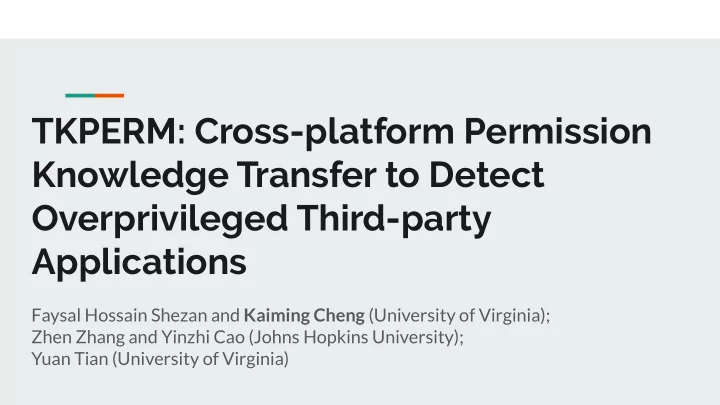

TKPERM: Cross-platform Permission Knowledge Transfer to Detect Overprivileged Third-party Applications Faysal Hossain Shezan and Kaiming Cheng (University of Virginia); Zhen Zhang and Yinzhi Cao (Johns Hopkins University); Yuan Tian (University of Virginia)
Permission-based access control Android Chrome IFTTT
Case Study Bridging the gap between user’s expectation and app behavior
Challenge Extensive data labeling and parameter tuning on new platforms Source code is often unavailable Reference: https://iot-analytics.com/iot-platform-companies-landscape-2020/ https://users.cs.northwestern.edu/~ychen/Papers/CCS14.pdf https://www.usenix.org/conference/usenixsecurity13/technical-sessions/presentation/pandita
Key Insight While these platforms are varied with different use cases, or have different sets of permissions, they are all user-facing, thus sharing certain aspects that are transferable across platforms.
Example
Background Transfer learning (TL) is a research problem in machine learning (ML) that focuses on storing knowledge gained while solving one problem and applying it to a different but related problem
Solution - Transfer Learning
System Overview
Implementation - Dataset Android : Adopted the crawled data, provided by the authors of Autocog Chrome Extension: We build a Chrome data crawler to get all the application’s information. IFTTT: We collected 259,523 IFTTT recipes in October 2017 using our crawler built with python and beautiful soup . SmartThings: We collected 243 SmartThings applications in August 2019.
Dataset - cont’d What is our labeling process ● How to handle disagreement ? ( agreement rate as 97.89% ) ● Example : ● ● “When you have a meeting, auto create a note at Evernote” , which belongs to an IFTTT recipe requiring access to Google Calendar.
Dataset - cont’d What is our labeling process ● How to handle disagreement ? ( agreement rate as 97.89% ) ● Example : ● ● “When you have a meeting, auto create a note at Evernote” , which belongs to an IFTTT recipe requiring access to Google Calendar. Two annotators have disagreement because one thinks that this sentence has no relationship with Google Calendar, while the other thinks that a recipe can only know that you have a meeting based on an access to Google Calendar.
Implementation - Dataset In total, we labeled 36,193 sentences from 1,234 Android applications, 666 sentences from 476 IFTTT recipes, 4,705 sentences from 319 Chrome extensions and 292 sentences from 243 SmartThings applications. https://drive.google.com/open?id=1cEZ4MiolsbV 4fXaDyJsUtHDGoPr8StjM” Password: 6eZPq2h”.
Models & Hypermeter The instance we used is called ‘p3.2xlarge’ with one NVIDIA Tesla V100 GPU, 16 Gibibyte GPU memory, 8 virtual central processing units (vCPUS) and 61 Gibibyte Main Memory. The operating system of this instance is the ‘Deep Learning Amazon Linux Version 23.0’. Learning rate = 0.01 Batch size = 256 Number of Epoch = 20 Rank size = 20
Algorithm & Application Adopts CBoW (Continuous Bag-of- Words) encoder to translate each ● sentence into a vector TKPERM pre-processes all the sentences by following the standard ● NLP practice, such as removing Unicode character, punctuation, stop words, etc Choose FCNN (Fully Connected Neural Network) for building our ● model structure for source domain knowledge distilling (Compared with LSTM)
Challenge -- How to handle unique permission Given that we have 9 different source domain, brute-forcing will occur ● 2^9 possibilities. State-of-the art domain selection technique doesn’t output desired ● outcome. (H-Divergence) What is our solution and our takeaway from that ? ● Discussion. ●
Challenge -- How to handle unique permission ●
Overhead
Discussion Theory vs Practice
Evaluation TKPERM identifies 329 overprivileged applications from all the different platforms.
Evaluation We find that the app overprivilege is a pervasive issues. On average, we find 32.33% of apps are overprivileged. 135 apps (28.36%) from IFTTT, 114 apps (35.73%) from Chrome Extension, and 80 apps (32.9%) from SmartThings are overprivileged.
Discussion Did you use experimentation artifacts borrowed from the community? -- Yes our Android dataset is inherited from AutoCog, and we also publish our dataset for future research Did you attempt to replicate or reproduce results of earlier research as part of your work? -- We try their work on different domains and didn’t receive good results, which is the key motivation for this research. What can be learned from your methodology and your experience using your methodology? -- When state-of-the-art algorithm didn’t work, we can come up with better/easier solution once we understand the problem we are facing What did you try that did not succeed before getting to the results you presented? -- We tried SDN dataset, but it doesn’t include detailed description/not having enough dataset.
Next Step Include more target platforms such as VR/AR when they gain more ● popularity. The concept of transfer learning could also be helpful for other ● problems in the cybersecurity domain, for example, to analyze network traffic for different IoT platforms Analyze the advantage and difficulty of our transfer learning ● experiment in the post-workshop paper.
Thank you
Recommend
More recommend